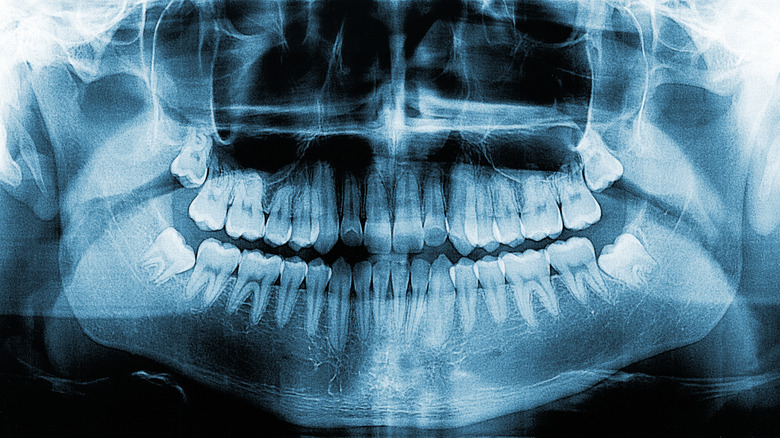Many people get their wisdom teeth removed at some point, usually when they are teenagers or young adults. Wisdom teeth are the third molars and the last teeth to erupt (via Mayo Clinic). They are called “wisdom teeth” because they usually come in around the age of 18, when people are considered to be wiser than they were as children. Wisdom teeth are typically removed because they can cause pain and discomfort when they aren’t removed, and they aren’t really necessary for humans. That being said, not everyone will need these teeth removed. Your dentist will let you know if they recommend the surgery for you.
You may have heard a rumor that your wisdom teeth can grow back after being removed. According to Healthline, this myth is not true. It is possible, however, to have more than four wisdom teeth, which is what people typically have. If you have more than four and they are not all removed at the same time, the remaining teeth may show up after your surgery. Called supernumerary teeth, these extra teeth are rare but not harmful. They will likely need to be removed as well if they are causing you pain or discomfort.
What to know about wisdom teeth removal

Wisdom teeth removal is a common procedure that many people undergo. Your dentist or oral surgeon will give you specific instructions on how to prepare for your wisdom teeth removal surgery (via Cleveland Clinic). Typically, you’ll be asked to not eat or drink anything after midnight the night before your surgery. This is because you’ll be given anesthesia during the procedure, which can make you nauseous if you have food in your stomach.
You’ll also need to arrange for someone to drive you home after your surgery, as the anesthesia can make it unsafe for you to drive yourself (via WebMD). During wisdom teeth removal surgery, you’ll be given local anesthesia to numb the area around your teeth. You may also be given general anesthesia, which will put you to sleep for the duration of the surgery. Once you’re ready, your dentist or oral surgeon will make an incision in your gums to access your wisdom teeth. They will then remove your wisdom teeth and any surrounding bone. Finally, they will close the incisions with stitches.
After your surgery, you’ll likely feel some pain and swelling in your mouth and jaws. Your dentist or oral surgeon will prescribe pain medication to help manage this discomfort. It’s important to follow all of your dentist or oral surgeon’s instructions during your recovery to ensure that you heal properly.




